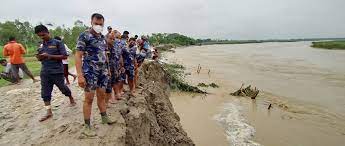
Nepal's sorrow: Spoiled river, swollen crisis
Can an unpurified river purify a man spiritually? Standing on the bank of the Bagmati River at the Pashupatinath Temple to watch bodies being cremated, tourists were shocked by the contrast between the Hindu beautiful belief and the ugly reality of this holy river.
Originating from the northern hills of Kathmandu Valley, Bagmati River flows through the valley and separates Kathmandu (capital of Nepal) and Lalitpur.
The famous river of great importance for Nepal has been under onslaught from riverains and small hotels and restaurants directly discharging sewage and dumping garbage and waste.
With such an odious sight, there is no riverine beauty, only an unpleasant odor carried far by the wind blowing onshore. Before entering the urban area of the valley, the Bagmati River has been polluted by agricultural and human waste. Its situation in downtown areas is worse than in the upper reaches.
About 100 metric tons of garbage has been collected from the river since the World Water Day (March 22), also as part of the Nepal National Water Week, which kicked off on Saturday with the theme "Water and Food Security".
Participants in the river cleanliness campaign said that few take sacred bath, something which mourners are supposed to do, after cremating bodies on Bagmati river banks close to the Pashupatinath Temple, a World Heritage Site in the eastern part of the capital.
Furthermore, in the rainless months, the Bagmati River, like other downtrodden rivers in the valley, has shrunk in size and become rivulet, indicating that urban development has put too much stress on river systems.
The holy river has stricken an alarming bell for Nepal, which is haunted by an old development syndrome thanks to the imbalance between rising population and economic growth. Without sustainable management approaches, the holy river worshipped by both Hindus and Buddhists would die. However, there still is the time to avert such catastrophe that no nation can afford.
(This article was released by Xinhua on March 21, 2012)


